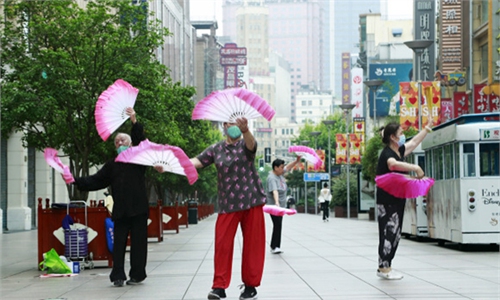Staggered peak cross-region travel encouraged for upcoming Spring Festival rush to ensure people return home safely

Attendants at a Fuxing train bring a performance to passengers as the bullet train with more than 700 passengers departs the Kunming Railway Station in Southwest China's Yunnan Province, marking the full operation of the China-Laos Railway. Photo: cnsphoto
Staggered peak cross-region travel is being encouraged for the upcoming Spring Festival rush known as chunyun to ensure people can return home safely for the holiday as the number of passengers is likely to see a substantial increase following China's optimized COVID-19 measures.
"During the Spring Festival rush, the passenger flow will rebound from low level, and the total passenger flow may see a substantial increase. The transportation of energy, food as well as medical supplies and essential goods will face an arduous task," according to the guidance issued by the Ministry of Transport (MOT) on Wednesday.
The 2023 chunyun is expected to reach 90 percent of the pre-epidemic level in 2019. About 360 million passenger trips will be made and the average daily number of trips will reach about 9 million, China Railway said on December 16 during a press conference outlining its preparation work for chunyun.
To guarantee safe and smooth family reunions, cities should explore staggered peak travel; transport departments should increase the frequency of transport to boost service capacity to meet demand. Schools should try to avoid asking students to return to campus within the chunyun period and let students make their own holiday plans, the guidance said.
Cities are suggested to adopt appropriate restrictions to slow down the flow of people in accordance with existing regulations and guide the public to avoid peak travel periods in light of the surging cases.
There are high expectations among migrant workers that they will be able to return to their hometowns to reunite with their family members during this upcoming Spring Festival. Chunyun in 2023 will last 40 days, from January 7 till February 15.
The normal operation of transportation during chunyun has been listed as one priority of transport departments. "If there is an emerging large-scale outbreak, emergency plans should be rolled out, such as having reserves ready and mobilizing other forces to take up the relevant positions so as to prevent the suspension of key transportation junctions, transport channels and services," the guidance reads.
The MOT has called for strengthened mobilization to ensure the normal transportation of energy, food and essential goods, as well as the transport of vaccines, antigens and other medical resources. Plans should be made to address any contingency.
"The shutdown of transportation and logistics infrastructure without authorization, and restriction of transportation services in any form should be prohibited," the ministry stressed.
COVID-19 measures during the 40-day-travel rush should be implemented in accordance with the new policy, which decides to downgrade the infectious disease from Class A to Class B management from January 8. Travel during the chunyun period will no longer require nucleic acid tests and health codes, while body temperature monitoring has also been scrapped.
Relevant departments must not set up checkpoints illegally or restrict the passage of vehicles, and previous suspended passenger transport should be resumed in a timely manner. Aside from testing and health codes being scrapped, public transport stations should be kept clean, disinfected and ventilated properly, with designated resting areas for passengers and staff who develop COVID-19-like symptoms, according to the guidance.
Health experts believed that the Spring Festival that coincides with the COVID-19 peak in some cities will not result in second infections of passengers and a larger scale of the outbreak.
"Currently, the infection scale in society has already reached a certain level and the possibility for a higher infection peak is low," Hu Guoqing, the head of Xiangya School of Public Health, Central South University, told People's Daily on Wednesday. "Society will gradually return to normal around the Spring Festival and embrace 2023 soon."
But passengers should still take precautions such as wearing masks and washing their hands properly, and staying healthy and having a positive mindset toward the infectious disease.
The MOT is requiring departments to include transport and logistics practitioners on a "whitelist," meaning they will not be subject to health-related checks or restrictions.
The health status of transport workers should be monitored as their infection risks will be high resulting from increasing flows of passengers and cargo at major ports. Staff members who develop COVID-19 should not be allowed to remain at their posts in principle.
The company encouraged the staff who got infected but felt well enough to work to go back their position in case there is a lack of staff in the upcoming Spring Festival travel season, Chang from China Railway Jinan Group Co, who is charge of the railway patrol and inspection from the city of Zibo to Jinan in East China's Shandong Province, told the Global Times.
Chang said since most of his colleagues have been infected, the company doesn't require nucleic acid testing but asked them to wear masks while working and protect themselves. Cheng expects he could be busier this year.
"The train shifts will definitely increase as we may have many more passengers compared with the last two years."




